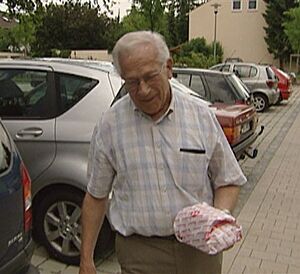Klaas Carel Faber facts for kids
Quick facts for kids
Klaas Carel Faber
|
|
|---|---|
 |
|
| Born | 20 January 1922 Haarlem, Netherlands |
| Died | 24 May 2012 (aged 90) Ingolstadt, Germany |
| Allegiance | |
| Service/ |
|
| Years of service | 1940–1945 |
| Battles/wars | World War II |
Klaas Carel Faber (born January 20, 1922 – died May 24, 2012) was a Dutch-German man who was found guilty of serious crimes during World War II. These types of crimes are called war crimes. He was known as one of the most wanted Nazi war criminals by the Simon Wiesenthal Center. Faber passed away in Germany in 2012. He was never sent back to the Netherlands to finish his prison sentence.
During World War II
Faber was born in Haarlem, a city in the Netherlands. His family had strong beliefs that supported the National Socialist movement. Before the war, Faber, his father, and his brother were all members of the National Socialist Movement in the Netherlands. This was a political group that supported Nazi ideas.
In 1940, after Germany took over the Netherlands, Faber joined the Waffen SS. This was a special military branch of the Nazi party. After five months, he left military training. He then took on easier police jobs in the cities of Rotterdam and The Hague.
In May 1943, Faber became a German citizen. This happened because of a special rule that gave German citizenship to foreigners who joined the Waffen-SS. From 1943 to 1944, he was in charge of a group that carried out executions at the Westerbork concentration camp. This camp was a terrible place where many people, including Anne Frank, were held before being sent to other camps.
Faber became even more involved in these activities after his father was killed in June 1944. His father was killed by a member of the Dutch resistance. Faber then joined a group called Silbertanne ("Silver Fir"). This group targeted members of the Dutch resistance. They also went after people who helped hide Jewish people or who were against the Nazis. He was also part of another group called Sonderkommando Feldmeijer. This group killed many innocent Dutch citizens. They did this as revenge for actions taken by the resistance. Faber also worked as a bodyguard for the Dutch Nazi leader, Anton Mussert.
After the War
After World War II ended, Faber was put on trial in the Netherlands. In June 1947, a Dutch court found him guilty. He was sentenced to death for killing 11 people at Westerbork and 11 others. The court said that Faber and his brother were "two of the worst criminals of the SS." Faber's brother was executed in 1948.
In January 1948, Faber's death sentence was changed to life imprisonment. But on December 26, 1952, he escaped from prison in Breda. He escaped with six other former members of the Dutch SS. That same evening, he crossed the border into Germany. It is believed that an organization of former Dutch fascists helped him escape. Because he had been a member of the SS, Faber had gained German citizenship. After his escape, Faber lived in the German city of Ingolstadt. He worked as an office clerk for the car company Audi until he retired.
Efforts to Bring Him to Justice
Over the years, there were many attempts to have Faber sent back to the Netherlands. In 1957, a German court in Düsseldorf dropped charges against him. They said there was not enough evidence. The Dutch government asked Germany to send Faber back in 1954 and again in 2004. Both requests were turned down by German officials. They referred to the 1957 decision.
In 2006, new evidence was shown to a court in Munich. However, the cases were seen as manslaughter, not murder. This meant they were past the time limit for prosecution. A new arrest warrant was needed from Dutch authorities to reopen the case. This happened partly because a Dutch journalist, Arnold Karskens, found where Faber was living in 2003. Many people, including those at a special event in 2007, asked for Faber to be sent back.
In April 2009, the Simon Wiesenthal Center listed Faber as one of the most important Nazi war criminals still at large. They pointed out his role in the Sonderkommando Feldmeijer execution squad. In August 2010, the Israeli government also asked Germany to make Faber serve his sentence. They also asked Germany to change its policy on Nazi war criminals.
In November 2010, the Netherlands issued a European Arrest Warrant for Faber. This was the first time the country had issued such a warrant for a war criminal. The request questioned if Faber's German citizenship was legal. German officials said they would look into the request.
In January 2012, the German Justice department asked the court in Ingolstadt to make Faber serve his life sentence. This was due to pressure from the Dutch government. However, Faber died before this request was granted.
Death
Klaas Carel Faber died on May 24, 2012. He passed away from kidney failure in Ingolstadt, Germany.
See also
- Dutch collaboration
- Dutch resistance
 | Aurelia Browder |
 | Nannie Helen Burroughs |
 | Michelle Alexander |

